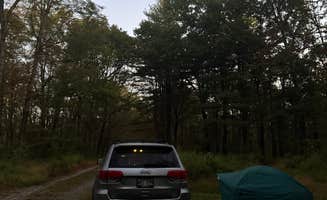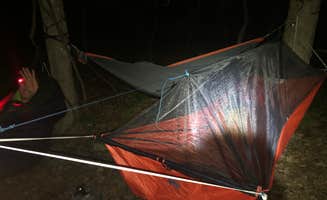Dispersed camping near Botsford, Connecticut offers outdoor enthusiasts access to primitive wilderness experiences across the New York-Connecticut border. This region features mixed hardwood forests with elevations ranging from 400 to 1,200 feet. Summer temperatures average 75-85°F, while winter camping requires preparation for temperatures that regularly drop below freezing from December through March.
What to do
Explore hiking networks: The 80-acre forest at Hemlock Ridge MUA Dispersed connects to several trail systems. "There's no spectacular mountain views from above, but rather a quiet peaceful wooded area," notes camper Dawn M., who appreciated the solitude of this basic camping area.
Wildlife observation: Early mornings at these sites provide optimal wildlife viewing opportunities, particularly for bird watchers. "There is plenty of trails to explore and wildlife to enjoy, especially since these over 900 acres also back up to another huge plot of protected forests," reports Doc B. about Taconic Hereford Multiple Use Park.
Access Appalachian Trail sections: Several dispersed camping areas serve as base camps for day hikes along the Appalachian Trail. Luke A. describes camping at Sage's Revine as "Fantastic spot, right near water. 12 platforms available," making it convenient for through-hikers or weekend explorers.
What campers like
Cell service reliability: Unlike many remote camping areas, some dispersed sites maintain connectivity. One camper notes that Taconic Hereford provides "the feeling of the wild, with the safety of having full cell service," an important consideration for those needing to stay connected.
Budget-friendly options: Cost-conscious campers appreciate that most dispersed sites are free or low-cost. Reviewer Licia S. notes Taconic Hereford Multiple Use Park "Was only $25 night. Great looking facilities and friendly staff."
Privacy between sites: The natural spacing of camping areas allows for personal space. At Hemlock Ridge MUA, Dawn M. reports "it's quiet and off the beaten path" and "you can set up your own camp anywhere," providing flexibility not found at developed campgrounds.
What you should know
Limited parking availability: Arrive early to secure a spot, especially during peak seasons. Dawn M. warns about Hemlock Ridge MUA Dispersed: "The parking lot only holds about 4-5 cars, 6 if you park real tight," making weekday arrivals preferable to weekend attempts.
Water source considerations: Many dispersed camping areas lack potable water. At Sage's Revine, campers have access to a "Near non-potable stream," according to Luke A., but proper filtration equipment remains essential.
Bug protection essential: Insects can be problematic during warmer months. Cory D. states plainly that at Hemlock Ridge, "Bugs are relentless," confirming the need for proper insect repellent and protective clothing from May through September.
Tips for camping with families
Safety notification protocols: Always inform others of your camping plans when using dispersed sites with children. One experienced camper advises, "Always let someone know where you are headed and when you plan to return," especially important when camping with younger family members.
Bear safety preparation: Teach children proper food storage procedures. Sage's Revine offers "bear boxes available," according to Luke A., making it more suitable for families concerned about wildlife encounters.
Establish boundaries: Set clear physical limits around your campsite for children, using natural landmarks. The platforms at Sage's Revine provide defined spaces with "50 feet between platforms," creating natural boundaries for family camping areas.
Tips from RVers
Limited accessibility: Most dispersed camping areas near Botsford require hiking in with gear. Cory D. notes that Hemlock Ridge serves as "A place to sleep near the gunks" for rock climbers, but confirms it "isn't a fancy campsite and has no amenities," making it unsuitable for RVs or trailers.
Seasonal road conditions: Access roads to these areas frequently become impassable after heavy rain or during winter months. Four-wheel drive vehicles may be necessary during spring thaw periods from March through early May.
Alternatives for vehicle camping: RVers should consider established campgrounds within 30 miles of Botsford that offer proper hookups and vehicle access instead of attempting to reach these dispersed sites.



